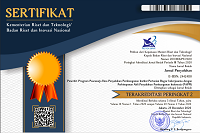Tingkat Kapasitas Pembudidaya Ikan dalam Mengelola Usaha Akuakultur secara Berkelanjutan
Abstract
This study was undertaken to identify fish farmer characteristic and supporting institutional, and to know the degree of fish farmer capacity to manage of aquabusiness sustainability. This was done by carrying out a survey involving random sample of 278 fish farmers from Bogor and Cianjur Districts of West Java Province. Both descriptive statistic and independent-samples T-test were used in analysing the data generated from the resesarch. Result presented showed that majority of fish farmers were low on formal education, non-formal education, business experience, family size, income, and business scale, but age was moderate. The supporting of institutional showed that support of financial institutional was low, input production institutional and marketing institutional was high, and information institutional was moderate. Performance of extension worker was low, and supporting of fish farmer group was high. Capacity of fish farmer as follows to practice of business function was moderate, to solve a problem was low, to plan of business and to adapt it to change of environment was high.
Key words: capacity, fish farmer, aquabusiness, sustainability
Downloads
Authors who publish with this journal agree to the following terms:
- Authors retain copyright and grant the journal right of first publication with the work simultaneously licensed under a

This work is licensed under a Creative Commons Attribution 4.0 International License that allows others to share the work with an acknowledgement of the work's authorship and initial publication in this journal. - Authors are able to enter into separate, additional contractual arrangements for the non-exclusive distribution of the journal's published version of the work (e.g., post it to an institutional repository or publish it in a book), with an acknowledgement of its initial publication in this journal.
- Authors are permitted and encouraged to post their work online (e.g., in institutional repositories or on their website) prior to and during the submission process, as it can lead to productive exchanges, as well as earlier and greater citation of published work (See The Effect of Open Access).















